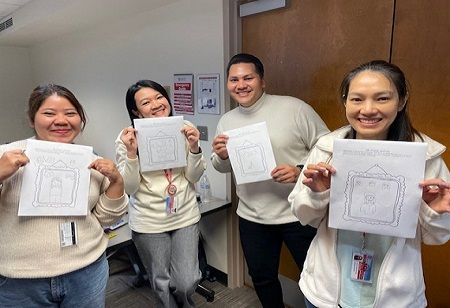-
Doctoral students from Srinakharinwirot University (SWU) in Bangkok, Thailand, visited Illinois State University for three weeks to take workshops, look around campus, and work on research projects. The two institutions' relationship dates back to the 1970s, and for more than 15 years it has incorporated this series of workshops sponsored by Illinois State graduate students and faculty.
"The doctoral students appreciate the workshops offered by our faculty, and faculty also appreciate their time with the doctoral students from Thailand", says Dr. Barbara Meyer, associate professor in the School of Teaching and Learning and international opportunities coordinator for the College of Education. "It gives them a different view as well".
The workshop facilitators all highlighted the universality of the issues they chose. Some directly answered a call from the SWU students to address classroom assessment for early childhood and middle school education.
Dr. Miranda Lin, an early childhood education professor at the School of Teaching and Learning, spoke about assessment as absolutely necessary to students and teachers at all grade levels. Having been to SWU twice, Lin knew the Thai students' choices and capabilities well and was able to anticipate what they would learn from her workshop.
"Through international collaboration, students learn to adapt the assessment instruments to suit their Thai context and students' needs. I hope they will return and disseminate what they have learned to their colleagues and implement it in their own teaching", says Lin.
Dr. Ellis Hurd, associate director of graduate programs, also facilitated a workshop on classroom assessment, focused on middle level students. He explained various kinds of formative and summative assessments such as norm-referenced, criterion-referenced, and authentic and collaboratively designed and then how these affect middle school development and identity.
Most significantly, we talked about how adolescents youth are neither children nor adults but exist in special developmental and distinct identity places (as in the middle) and therefore require innovative and creative measures in schools to balance the quantities of national and high-stakes tests they already take every academic year", says Hurd.
He also spoke about how genuine methods of assessment can push back on a culture of global competitiveness sometimes linked with high stakes testing. Another workshop outlined one such method through the concept of responsible literacy in practice. Wanda Turk, tutoring coordinator for the Mary and Jean Borg Center for Reading and Literacy and doctoral student in the School of Teaching and Learning, spoke with Dr. Erin Quast, associate professor in the School of Teaching and Learning, and fellow graduate student Ayesha Siddiqua. By means of an engaging and interactive blend of reflective and creative writing prompts, book conversations, and an assessment simulation, Turk and her colleagues employed the Illinois Comprehensive Literacy Plan as a model.
"The workshop discussion focused on how we, as teachers, respond to students' cultures and identities, languages, families, out-of-school needs, and academic strengths and needs", Turk stated. In a similar vein, other workshops included behavior modification, social emotional learning, and bilingual education, which allowed for seeing similarities and differences in Thailand as compared to the United States.
Dr. Amanda Quesenberry, an early childhood special education professor, invited the SWU students to provide examples of behaviors they had encountered: "This workshop pointed out the similarities teachers face in their work with students in the U.S. and elsewhere, in this instance Thailand. I appreciated hearing from the participants about difficulties they have and the methods they employ to resolve these difficulties.". I think that we all learned from one another and were able to come up with new ideas for how to assist students and learning.
Professor Dr. Kyle Miller of elementary education and child development also indicated an element of universality and sharedness in speaking about trauma-informed and healing-centered pedagogy.
If you work with human beings, an understanding of trauma and protective factors will stand you in good stead," Miller stated. "They are also critical in building classroom contexts in which students will flourish. We used to conceptualize trauma as an individual process but now as a collective process. That fits with the conception of partnerships we are all doing the learning and healing together.
During her bilingual education and teacher identity workshop, Dr. Vivian Presiado, an assistant professor of bilingual/bicultural education, saw a common sense of urgency and advocacy for multilingual students. She appreciated how she and the SWU students met on various levels as they discussed how bilingualism fosters cross-cultural understanding. "This kind of collaboration is empowering and transformational", Presiado stated.
The advantages of the alliance between Illinois State and SWU, according to Meyer, are no longer limited to the College of Education but now extend to the entire campus, such as study abroad programs, faculty exchange or sabbaticals, and publishing and research opportunities. "There is so much more that we could do with this collaboration", Meyer says. "Both universities need to decide what our next initiative might be".
Whatever it is, it will always go on to energize world change through cross-cultural awareness and collaboration opportunities.
🍪 Do you like Cookies?
We use cookies to ensure you get the best experience on our website. Read more...

